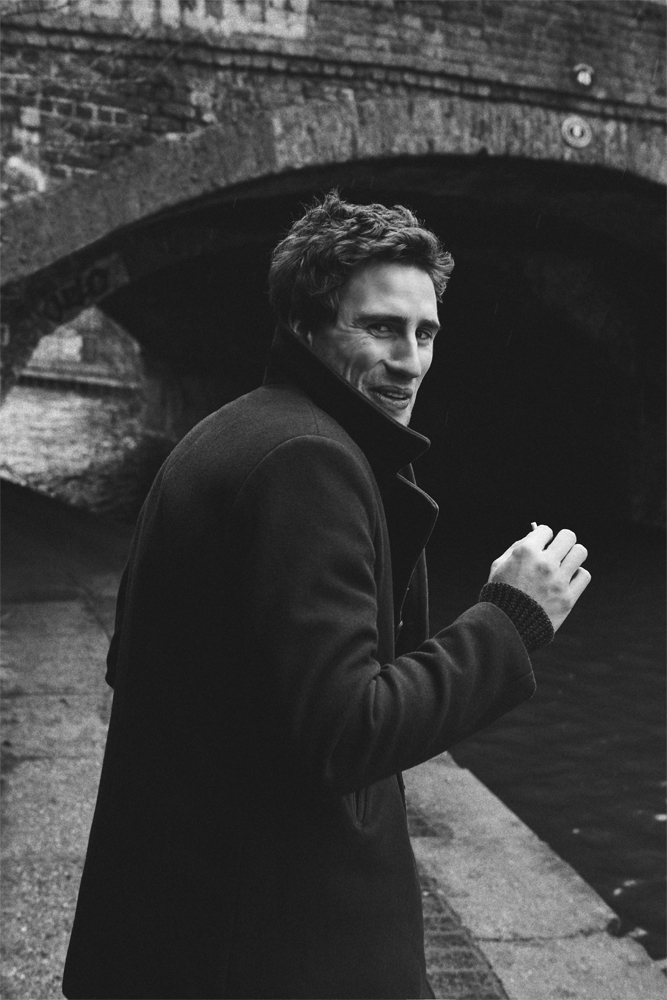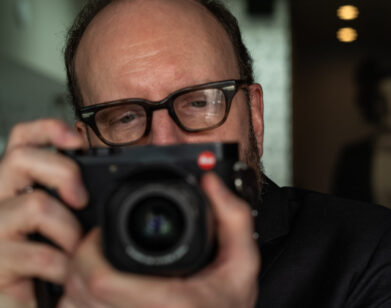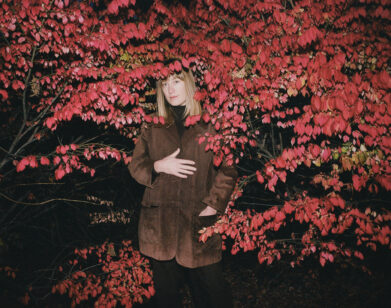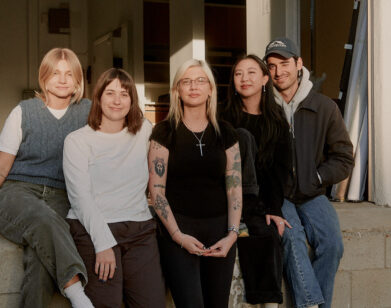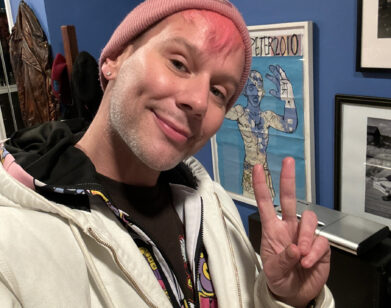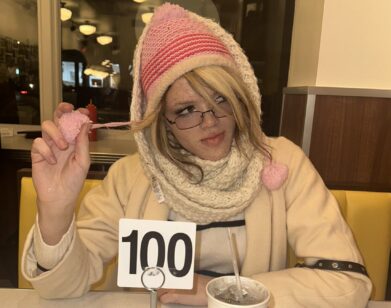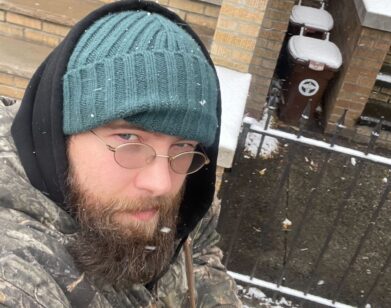Spy Games
ABOVE: EDWARD HOLCROFT IN LONDON, JANUARY 2016. PHOTOS: HANS NEUMANN. STYLING: SOPHIE PERA/SEE MANAGEMENT. GROOMING: MIKE HARDING USING BUMBLE AND BUMBLE. SPECIAL THANKS: THE OARSMAN STUDIO.
Actor Edward Holcroft isn’t interested in typical tales and happy endings. This is apparent in his choice of roles to date: as failed intelligence recruit Charlie Hesketh in Kingsman: The Secret Service he was a posh bully-turned-villain; in the Golden Globe-winning miniseries Wolf Hall he was George Boleyn, accused of incest with his sister, Queen Anne Boleyn, resulting in him going toe-to-toe with Thomas Cromwell (Mark Rylance). Holcroft’s disinterest in the standard is equally apparent in his demeanor. When we caught up with the 28-year-old London native over the phone, he transitioned seamlessly between sarcasm and sincerity, his wry, British humor taking hold before giving in to thoughtful, conversational tangents on acting and what he’s looking for in it.
“Ideally, you want to be doing something that you really want to do,” he tells us. “And that always comes down to the writing and the role. For me, something has got to really draw you to the character. You’ve got to really want to play it otherwise there’s a better person out there to play it. I always think that there’s no point in doing something unless you’re going to give it everything,” he continues. “There is still a lot to learn on camera that I haven’t learned yet. I would like to keep exploring.”
Currently, Holcroft is a spy once more in the BBC America mini-series London Spy. As Alex, he’s a mathematical prodigy with an unclear lineage and allegiances to MI6. He falls for Danny (Ben Whishaw), his first true love and relationship, after a chance meeting—and a second, orchestrated one on Danny’s part—on London’s Lambeth Bridge. The pair’s story, one of two young men unsuited for each other in lifestyle but fitting against the odds, proceeds quickly. At the end of the first episode, which aired two weeks ago, the untimely death of Holcroft’s character was revealed. The circumstances surrounding it, however, remain foggy until the show’s finale—for both the viewer and Danny alike.
As London Spy airs in the United States, Holcroft is performing onstage at London’s Donmar Warehouse in Les Liaisons Dangereuses, a play based on Choderlos de Laclos’ 18th century epistolary novel. He recently wrapped The Sense of an Ending, a feature film based on the eponymous Julian Barnes novel, earlier in 2015, and is also preparing to film the Kingsman sequel.
HALEY WEISS: Alex, your character in London Spy, is frequently described as enigmatic. How would you characterize him?
EDWARD HOLCROFT: I think he’s lonely. For me, that was the biggest part of his character. What is it like for somebody to be really alone in the world? To have no friends, to have never had a relationship, never really talked to anyone outside your work? And [to have] this want to find something, but not have the social ability to because he’s never practiced it? He’s never been in social situations and he doesn’t know how to socialize. It was more about being lonely, rather than enigmatic. I just think he doesn’t know how to show emotions or how to convey it.
WEISS: While the story isn’t based on the life of Gareth Williams, [an MI6 agent whose suspicious death has been surrounded with speculation], the circumstances of Alex’s death do echo his. Did that inform your role at all?
HOLCROFT: Not really. When I read it, I thought of Gareth Williams pretty quickly but I didn’t go any farther than just the thought. I didn’t research him because they’re different people and although the idea may have some connection to it, the individual of Alex is a fictitious character, and a very different character. I didn’t want to get sidetracked by someone real.
WEISS: Would you consider the show a love story, a spy thriller, or both?
HOLCROFT: I think it’s both; it’s a spy thriller that is motivated by a love story. At the crux of the story is the relationship between Danny and Alex, and without that, there wouldn’t be the story.
WEISS: Most of your scenes are one-on-one with Ben Whishaw. Had you worked with him prior to this show?
HOLCROFT: No, I had never met him.
WEISS: What was that experience like?
HOLCROFT: Terrible. [laughs] It was awful. He was one of the worst people to work with in the world. I mean, he’s a real diva, such a bad actor. [laughs] No, it was great. He, as I’m sure you know, is a very talented individual and also a very decent, kind, fun person. We got on really well and as a consequence we’re now very good friends.
WEISS: I know you’re also in a play right now, Les Liaisons Dangereuses. How has that been for you?
HOLCROFT: It has been a brilliant experience. I’ve never done theater so it’s new ground. It’s scary; there is nowhere to hide on a stage. On camera, you can hide, you can cut, you can shoot again and do it until it’s good, whereas in theater you can’t hide. Once you walk on you have to be believable the whole time otherwise you get found out. It’s a great skill to learn as an actor. It’s very important and I’ve now seen that. So it’s been a very good thing.
WEISS: Have you enjoyed being able to return to the same lines and scenes night after night?
HOLCROFT: It’s hard. It provides challenges, there’s no doubt. You’ve got to find ways of keeping it fresh, but it’s a good discipline. And it’s always different because every audience is different. Some audiences are half asleep, some are shouting, and your performance changes in accordance to what you’re getting back. The great thing about theater is that it’s a two-way thing, you get energy from the audience and the audience gets energy from you.
WEISS: You were able to work with Charlotte Rampling and Jim Broadbent again in The Sense of an Ending. Was filming more comfortable having known them from London Spy?
HOLCROFT: No, it was terrible.
WEISS: Everything is terrible.
HOLCROFT: Everything is terrible! [laughs] I didn’t actually have much to do with them in The Sense of an Ending. I know that they’re in it, but my scenes weren’t with them. But I did see Jim. Charlotte and Jim are kind of brilliant examples of not only very talented actors, but just such nice people. I can’t begin to tell you. They’re so unfazed by the industry side of it, they don’t really have time for it, which is such an admirable quality when people are really talented. They don’t buy in to some of the bullshit that comes with it. They have very quiet lives and they’re great.
WEISS: I read that you think it’s important to maintain a certain air of mystery as an actor. Can you tell me a little bit about that?
HOLCROFT: I don’t think it’s a new concept. I should think most actors probably think this, but I know that when I watch actors, the actors who I know least about I buy into more because I can imagine them as the character. It’s as simple as that. If you lead a very high profile life—and of course, it’s easy to say this, and if you become incredibly famous because of your work some of that is unavoidable—but if you can do as much as you can to keep away from some of that limelight then you just help yourself when it comes to your work. You have a blank canvas, as it were, to work with, rather than people knowing a whole bunch about your life or what you get up to, what you had for breakfast. Everyone is different, and each to their own, as they say, but for me that’s what I would like to try and establish.
WEISS: You live in London now, but did you grow up there as well?
HOLCROFT: I did, I grew up here. I was sent off to boarding school when I was eight until 18. That was outside of London in the countryside, so I sort of took a break and came back. I am a Londoner but boarding school makes you feel a bit [pauses] I don’t know what the word is, but you’re sort of a traveler, as it were. Boarding school is a very… It’s not a harsh environment, but you have to be quite tough and that probably put me in quite good stead for this profession. You need to have a thick skin.
WEISS: Were you acting at all when you were in boarding school?
HOLCROFT: No, no. God no. I did a tiny, tiny bit. I used to play girls because I had killer legs. [both laugh] No, I didn’t. I was terrible but I looked the youngest so I played the odd woman, but in short, I never had the dream of being an actor until I was at least 22.
WEISS: What was your first role then?
HOLCROFT: In my whole life? I was at school when I was 12 and I played Curley’s wife in John Steinbeck’s Of Mice and Men, who gets killed by the lead character, Lenny. She gets murdered. So I was a girl who got murdered! [laughs] They obviously saw me doing big, big things.
WEISS: What made you decide to pursue acting seriously later on in life?
HOLCROFT: Lack of options? No, I don’t know, I was just sort of drawn to it, I think. It was not a life-long ambition. I saw Mark Rylance in a play called Jerusalem, which was seven or eight years ago now, and it was the first time that I had been really moved by something on stage. I had loved theater but I had never really fully bought into it. I always knew I was sitting in a theater and I was next to people and it never had quite the same impact that film did. But then I watched him. It was so electric and I could feel it. I had never had that before and I remember thinking, “I’ve got to do that. I’ve got to try that.” I was just drawn to it and I don’t really know how to put my finger on it, but anyway after that I sort of thought, “Right, there’s that and a lack of options.” [laughs]
WEISS: So it must have been exciting to be George Boleyn and play across [Mark Rylance] in scenes [while filming Wolf Hall].
HOLCROFT: Yeah, it was great. I like those moments in life, where life completes little mini stories. It started when I saw him on stage and life thought it would tie the knot in a circle and finish it when I met him on set for Wolf Hall. It was wonderful.
WEISS: You attended drama school at the Drama Centre. What made you choose that program in particular?
HOLCROFT: Michael Fassbender and Tom Hardy had just been there. Literally, that was the reason. I didn’t know much about acting, I didn’t know much about the drama schools. I knew that there were sort of four or five really good schools, like RADA and LAMDA, and Drama Centre was one of them, and I didn’t know how to pick because I didn’t know what I wanted from each school and I didn’t know what I was doing. So I just picked actors who I had seen around that time who I thought had been brilliant. I remember I had seen Fassbender in Hunger and I thought, “Where did he go to school?” I looked it up and it said Drama Centre so I said, “Right, I’m going to go there.” And that was that. I turned up and then I got in.
It’s probably the most unromantic reason to go to a school, most people wanted to go to RADA since they were three. But all I knew was what I liked. I knew that I didn’t know anything else about acting; I just knew that I had liked Mark Rylance and I had liked what I saw in Hunger with Michael Fassbender. That’s all I had, really, was an instinct. So I thought I’d just tread in their footsteps and do what I can.
LONDON SPY AIRS THURSDAYS ON BBC AMERICA AT 10PM ET.

